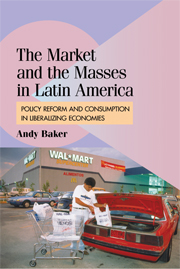Book contents
- Frontmatter
- Contents
- Figures and Tables
- Acknowledgments
- The Market and the Masses in Latin America
- Part I Introduction and Theory
- Part II Mass Beliefs about Market Policies in Latin America
- Part III Mass Support for Reform in Brazil
- 6 THE ECONOMIC CONSEQUENCES AND ELITE RHETORIC OF MARKET REFORM IN BRAZIL
- 7 HOW MANY BRAZILIANS SUPPORT MARKET REFORMS?
- 8 WHICH BRAZILIANS SUPPORT MARKET REFORMS?
- Part IV Conclusion
- Survey Data Appendix
- References
- Index
- Titles in the series
8 - WHICH BRAZILIANS SUPPORT MARKET REFORMS?
Published online by Cambridge University Press: 22 August 2009
- Frontmatter
- Contents
- Figures and Tables
- Acknowledgments
- The Market and the Masses in Latin America
- Part I Introduction and Theory
- Part II Mass Beliefs about Market Policies in Latin America
- Part III Mass Support for Reform in Brazil
- 6 THE ECONOMIC CONSEQUENCES AND ELITE RHETORIC OF MARKET REFORM IN BRAZIL
- 7 HOW MANY BRAZILIANS SUPPORT MARKET REFORMS?
- 8 WHICH BRAZILIANS SUPPORT MARKET REFORMS?
- Part IV Conclusion
- Survey Data Appendix
- References
- Index
- Titles in the series
Summary
The socialist character of the PT is … revealed in the fact that the basis of our platform is workers' demands. Workers' demands are the fundamental force behind our mobilization and electoral struggle.
– Workers Party (PT) platform in 1989 (Diretório Nacional do PT 1998, 384)Leaders of the popular classes, intellectuals, artists, and religious people with a variety of ideological stripes have spontaneously declared their support for a project of change in Brazil. Significant portions of the business community are also joining our project. This is a vast coalition – in many respects a “supra-party” coalition – that is looking for new horizons for the country.
– Luiz Inácio Lula da Silva, as presidential candidate of the Workers Party in 2002, excerpted from his “Letter to the Brazilian People” (Silva 2002, 1)Brazil has one of the most unequal distributions of income in the world. Some observers describe Brazil as “Belindia,” where a few million citizens enjoy the living standards of Belgium and tens of millions suffer through those of India. Amid this inequality, most parties are devoid of ideology and programmatic orientations, geared instead to municipal-level pork-barrel politics and particularistic benefits (Ames 2001; Samuels 2003). Moreover, the degree of partisan identification is low, and citizens hold their elected officials in low regard (Mainwaring 1999; Samuels 2006). Because of these circumstances, one might expect bottom-up factors such as wealth rather than top-down factors such as political predispositions and elites to shape public opinion about the most crucial issues of the day.
- Type
- Chapter
- Information
- The Market and the Masses in Latin AmericaPolicy Reform and Consumption in Liberalizing Economies, pp. 229 - 254Publisher: Cambridge University PressPrint publication year: 2009



